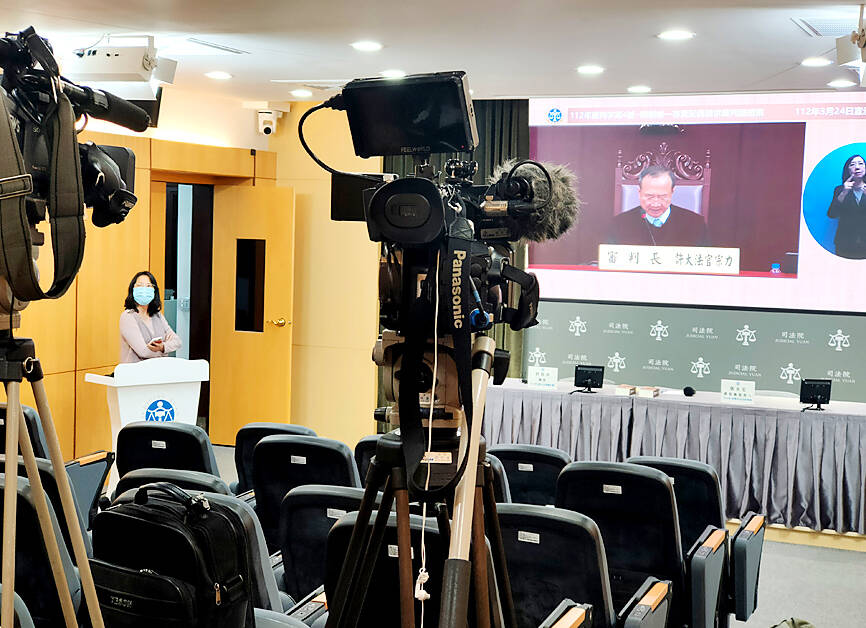The Constitutional Court yesterday said that a law barring the “responsible” party from filing for divorce is not flawed in principle, but ordered the Legislative Yuan to better define the clause and provide a statute of limitations.
Article 1,052 of the Civil Code states: “Either the husband or the wife may petition for a juridical decree of divorce ... except if either the husband or the wife is responsible for the event, only the other party may petition for the divorce.”
Kaohsiung Juvenile and Family Court Judge Chu Cheng-kun (朱政坤) and two individuals embroiled in extramarital lawsuits filed for the constitutional interpretation, claiming that the article contravened the legal principle of proportionality.

Photo: Wang Yi-sung, Taipei Times
Legal experts said on condition of anonymity that under the Civil Code, only the person who “is not” or “is less” at fault can file for divorce.
Chu and the others argued that Article 1,052 limits the constitutionally guaranteed right to freedom of marriage.
After reviewing the case, the court ruled that the proviso in principle does not contravene the Constitution’s guaranteed right of freedom of marriage.
However, it did find the blanket ban barring the party responsible for the act causing the breakdown of the marriage from filing for divorce — regardless of whether it occurred so far in the past that it has exceeded legal memory or how long it continued — might be too strict.
In this sense, the proviso contravenes the freedom of marriage under the Constitution, it said.
The court ordered competent authorities to immediately draft an amendment to the article that would bring it in line with the Constitution and implement it within two years.
Should the amendment take longer than two years to pass, all rulings after March 24, 2025, should observe the spirit of the ruling, the court said.
It suggested that legislators define the “period” after or during an act causing the irreparable breakdown of a marriage for it to be considered as such.
It also suggested that legislators observe similar cases in foreign countries and consider eligible relaxing causes to file for divorce.
The legal system should adapt to the times and make provisions so that the rights of individuals without fault and children still under their care are protected by the law during the divorce process, the ruling said.
Disagreeing with the ruling, Chu said the proviso prevents couples who have already separated in spirit from being able to separate legally.
The Ministry of Justice said the proviso protects the sanctity of marriage, as it prevents any one party from unilaterally dissolving the marriage.
Additional reporting by Wu Cheng-feng

Chinese Nationalist Party (KMT) Chairman Eric Chu (朱立倫), spokeswoman Yang Chih-yu (楊智伃) and Legislator Hsieh Lung-chieh (謝龍介) would be summoned by police for questioning for leading an illegal assembly on Thursday evening last week, Minister of the Interior Liu Shyh-fang (劉世芳) said today. The three KMT officials led an assembly outside the Taipei City Prosecutors’ Office, a restricted area where public assembly is not allowed, protesting the questioning of several KMT staff and searches of KMT headquarters and offices in a recall petition forgery case. Chu, Yang and Hsieh are all suspected of contravening the Assembly and Parade Act (集會遊行法) by holding

PRAISE: Japanese visitor Takashi Kubota said the Taiwanese temple architecture images showcased in the AI Art Gallery were the most impressive displays he saw Taiwan does not have an official pavilion at the World Expo in Osaka, Japan, because of its diplomatic predicament, but the government-backed Tech World pavilion is drawing interest with its unique recreations of works by Taiwanese artists. The pavilion features an artificial intelligence (AI)-based art gallery showcasing works of famous Taiwanese artists from the Japanese colonial period using innovative technologies. Among its main simulated displays are Eastern gouache paintings by Chen Chin (陳進), Lin Yu-shan (林玉山) and Kuo Hsueh-hu (郭雪湖), who were the three young Taiwanese painters selected for the East Asian Painting exhibition in 1927. Gouache is a water-based

Taiwan would welcome the return of Honduras as a diplomatic ally if its next president decides to make such a move, Minister of Foreign Affairs Lin Chia-lung (林佳龍) said yesterday. “Of course, we would welcome Honduras if they want to restore diplomatic ties with Taiwan after their elections,” Lin said at a meeting of the legislature’s Foreign Affairs and National Defense Committee, when asked to comment on statements made by two of the three Honduran presidential candidates during the presidential campaign in the Central American country. Taiwan is paying close attention to the region as a whole in the wake of a

OFF-TARGET: More than 30,000 participants were expected to take part in the Games next month, but only 6,550 foreign and 19,400 Taiwanese athletes have registered Taipei city councilors yesterday blasted the organizers of next month’s World Masters Games over sudden timetable and venue changes, which they said have caused thousands of participants to back out of the international sporting event, among other organizational issues. They also cited visa delays and political interference by China as reasons many foreign athletes are requesting refunds for the event, to be held from May 17 to 30. Jointly organized by the Taipei and New Taipei City governments, the games have been rocked by numerous controversies since preparations began in 2020. Taipei City Councilor Lin Yen-feng (林延鳳) said yesterday that new measures by